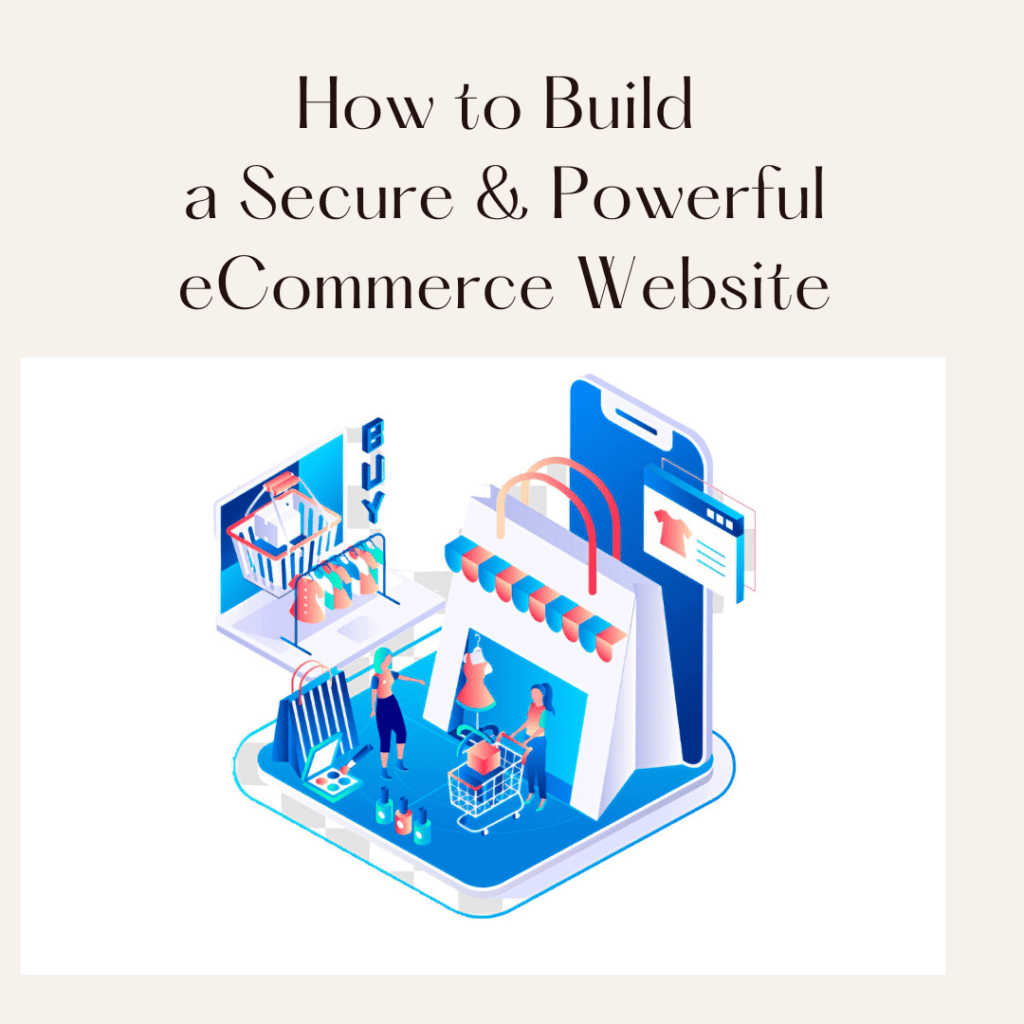How to build a secure & powerful ecommerce website.
E-commerce has become an integral part of the modern business landscape, and building a secure and powerful e-commerce website is a critical aspect of success in this domain. A secure e-commerce website can instill trust in customers and protect sensitive data, while a powerful one can streamline operations and enhance user experience. In this blog, we will discuss the key steps involved in building a secure and powerful e-commerce website.
Powerful ecommerce website – Choose a reliable e-commerce platform
Choosing a reliable e-commerce platform is crucial to building a secure and powerful e-commerce website. There are numerous e-commerce platforms available, and it can be challenging to select the right one for your business. To make an informed decision, you need to consider various factors.
- Security features: Security should be a top priority when selecting an e-commerce platform. Look for platforms that offer robust security features such as SSL encryption, PCI compliance, and two-factor authentication.
- Customization options: Every e-commerce business is unique, and you need an e-commerce platform that can be customized to meet your specific needs. Look for platforms that offer a wide range of customization options such as design templates, plugins, and third-party integrations.
- Ease of use: A user-friendly e-commerce platform can save you time and money. Look for platforms that are easy to set up, manage, and maintain. Consider factors such as the user interface, available documentation, and customer support.
- Scalability: Your e-commerce business may grow over time, and you need a platform that can scale with your business. Look for platforms that offer scalability options such as unlimited products, bandwidth, and storage.
Now, let’s take a closer look at some popular e-commerce platforms:
- Shopify: Shopify is a popular e-commerce platform that offers a wide range of features, including an easy-to-use website builder, a variety of design templates, and robust security features. Shopify is ideal for small to medium-sized businesses, and it offers scalability options for growing businesses.
- WooCommerce: WooCommerce is a popular e-commerce platform that is built on WordPress. It offers numerous customization options, including design templates, plugins, and third-party integrations. WooCommerce is ideal for businesses of all sizes, and it is highly customizable.
- Magento: Magento is a powerful e-commerce platform that offers robust features and customization options. It is highly scalable and can handle large e-commerce businesses. However, Magento can be complex to set up and maintain, and it may not be suitable for small businesses.
- BigCommerce: BigCommerce is a user-friendly e-commerce platform that offers a wide range of features, including robust security features and scalability options. BigCommerce is ideal for small to medium-sized businesses, and it offers an easy-to-use website builder.
In conclusion, choosing a reliable e-commerce platform is critical to building a secure and powerful e-commerce website. Consider factors such as security features, customization options, ease of use, and scalability when selecting an e-commerce platform. Shopify, WooCommerce, Magento, and BigCommerce are popular options that offer unique features and benefits for different types of e-commerce businesses.
You could buy a website from Namecheap. Namecheap is committed to offering the industry’s best value and customer service for domains, SSL certificates, hosting and more. Increase your sales while helping your clients build or improve their web presence. Join today and start earning.

Powerful ecommerce website – Use HTTPS
Using HTTPS is an essential security measure for e-commerce websites. HTTPS, or Hypertext Transfer Protocol Secure, is a secure version of the standard HTTP protocol used for transmitting data over the internet. It uses SSL/TLS (Secure Sockets Layer/Transport Layer Security) encryption to secure the data transmitted between the user’s browser and the server.
When a user visits an e-commerce website, their browser sends a request to the server to retrieve the website’s content. If the website uses HTTPS, the server responds by sending a digital certificate to the browser, verifying the website’s authenticity. The browser then uses this certificate to establish a secure connection with the server, encrypting all data transmitted between the two.
By using HTTPS, e-commerce websites can protect sensitive information such as credit card details, login credentials, and personal information from being intercepted by attackers. HTTPS ensures that the data transmitted between the user’s browser and the server is encrypted, making it difficult for attackers to intercept and read the data.
To implement HTTPS, e-commerce websites need to obtain an SSL certificate from a reputable certificate authority (CA). An SSL certificate is a digital certificate that verifies the website’s identity and enables SSL/TLS encryption. The SSL certificate contains information such as the website’s domain name, the certificate’s expiration date, and the certificate authority that issued it.
There are several types of SSL certificates available, including single-domain certificates, wildcard certificates, and extended validation (EV) certificates. The type of SSL certificate needed depends on the website’s requirements and the level of security needed.
In conclusion, using HTTPS is crucial for e-commerce websites to ensure the security of sensitive information. HTTPS encrypts data transmitted between the user’s browser and the server, preventing attackers from intercepting and reading the data. To implement HTTPS, e-commerce websites need to obtain an SSL certificate from a reputable certificate authority. By using HTTPS, e-commerce websites can provide their customers with a secure and trustworthy shopping experience.

Powerful ecommerce website – Implement strong authentication measures
Implementing strong authentication measures is a crucial step in building a secure and powerful e-commerce website. Strong authentication measures help prevent unauthorized access to user accounts, which can compromise sensitive information such as credit card details and personal information. There are several authentication measures that e-commerce websites can implement to enhance security:
- Two-factor authentication (2FA): Two-factor authentication is a security measure that requires users to provide two forms of identification to access their accounts. For example, a user may be required to enter their password and then enter a one-time code sent to their mobile device. 2FA helps prevent unauthorized access to user accounts even if an attacker has obtained the user’s password.
- CAPTCHAs: CAPTCHAs are security measures that require users to complete a task to prove that they are not automated bots. For example, users may be required to enter a series of letters or numbers displayed in an image. CAPTCHAs help prevent automated attacks such as brute-force attacks and protect user accounts from unauthorized access.
- Password policies: Implementing password policies that require users to choose strong passwords and change them regularly can further enhance security. Password policies may require users to choose passwords that are at least eight characters long, contain a mix of uppercase and lowercase letters, numbers, and special characters. Regularly changing passwords can help prevent attackers from accessing user accounts even if they have obtained the user’s password.
In addition to these measures, e-commerce websites should also consider implementing other security measures such as session management, access control, and intrusion detection systems. Session management involves managing user sessions to ensure that users are logged out after a period of inactivity or when they close their browser. Access control involves limiting access to sensitive information to authorized users only. Intrusion detection systems help detect and prevent unauthorized access to the website’s systems and data.
In conclusion, implementing strong authentication measures is crucial for building a secure and powerful e-commerce website. Two-factor authentication, CAPTCHAs, and password policies can help prevent unauthorized access to user accounts and protect sensitive information. Additionally, e-commerce websites should also consider implementing other security measures such as session management, access control, and intrusion detection systems. By implementing these measures, e-commerce websites can provide their customers with a secure and trustworthy shopping experience.
Implement security plugins
Implementing security plugins is another important step in building a secure and powerful e-commerce website. Security plugins can help protect websites from common attacks such as SQL injection, cross-site scripting (XSS), and brute-force attacks. These attacks can compromise sensitive information and disrupt website functionality, leading to a poor user experience.
Here are some popular security plugins that can help enhance the security of e-commerce websites:
- Wordfence: Wordfence is a security plugin for WordPress websites that provides real-time protection against malware, viruses, and other threats. Wordfence includes features such as firewall protection, malware scanning, and two-factor authentication.
- Sucuri: Sucuri is a cloud-based security platform that provides website security and performance optimization services. Sucuri includes features such as malware scanning, firewall protection, and DDoS (Distributed Denial of Service) protection.
- iThemes Security: iThemes Security is a security plugin for WordPress websites that provides features such as malware scanning, two-factor authentication, and brute-force protection. iThemes Security also includes a dashboard that provides an overview of website security status and issues.
These security plugins can help protect e-commerce websites from various security threats and attacks. They can detect and prevent SQL injection, XSS, and brute-force attacks, which are common attack vectors for e-commerce websites. Security plugins can also provide real-time protection against malware and viruses, which can compromise sensitive information and damage website functionality.
In addition to security plugins, e-commerce websites should also keep their software and plugins up to date to ensure that they are protected against known vulnerabilities. Regular backups should also be performed to ensure that website data can be restored in the event of a security breach or data loss.
In conclusion, implementing security plugins is an important step in building a secure and powerful e-commerce website. Wordfence, Sucuri, and iThemes Security are popular security plugins that can help protect e-commerce websites from common security threats and attacks. By implementing security plugins and following other best practices, e-commerce websites can provide their customers with a secure and trustworthy shopping experience.
Powerful ecommerce website – Regularly update software and plugins
Regularly updating software and plugins is a crucial step in building a secure and powerful e-commerce website. Updates often include security patches that address known vulnerabilities, so failing to update can leave the website vulnerable to attacks.
Here are some reasons why regular updates are important:
- Security patches: Updates often include security patches that address known vulnerabilities in software and plugins. These vulnerabilities can be exploited by attackers to gain unauthorized access to the website, steal sensitive information, or cause other forms of damage.
- Bug fixes: Updates may also include bug fixes that address issues with the software or plugin. These issues can cause the website to malfunction or perform poorly, leading to a poor user experience.
- Compatibility: Updates may also be necessary to ensure compatibility with other software or plugins. Failing to update can cause compatibility issues that can lead to website errors or malfunctions.
- New features: Updates may also introduce new features or enhancements that can improve the functionality or performance of the website.
To ensure that software and plugins are regularly updated, website owners should set up automatic updates or regularly check for updates manually. Automatic updates can be set up through the website’s content management system (CMS) or hosting provider, while manual updates can be performed through the CMS or plugin settings.
It is also important to test updates before deploying them to the live website. Testing can help identify any compatibility issues or conflicts with other software or plugins before they cause problems on the live website.
In conclusion, regularly updating software and plugins is crucial for maintaining the security and functionality of e-commerce websites. Updates often include security patches, bug fixes, and compatibility improvements that can enhance website performance and protect against known vulnerabilities. By setting up automatic updates or regularly checking for updates manually, website owners can ensure that their website is up to date and protected against security threats.
Use a secure payment gateway

Using a secure payment gateway is a critical step in building a secure and powerful e-commerce website. A payment gateway is an e-commerce application that authorizes payment transactions between the customer and the merchant. It acts as a mediator between the customer’s payment account and the merchant’s bank account, ensuring that payment information is securely transmitted and processed.
Here are some factors to consider when choosing a payment gateway:
- Security features: Look for payment gateways that offer robust security features such as encryption, tokenization, and fraud detection. These features help protect sensitive payment information from theft or fraud.
- Transaction fees: Payment gateways typically charge a fee for each transaction. Consider the transaction fees and any other costs associated with the payment gateway when making your selection.
- Ease of use: Choose a payment gateway that is easy to integrate with your e-commerce platform and easy for your customers to use.
- Compatibility: Ensure that the payment gateway you choose is compatible with your e-commerce platform and any other software or plugins you may be using.
- Reputation: Choose a payment gateway with a good reputation for reliability and security. Look for customer reviews and ratings to help you make an informed decision.
Some popular payment gateway options include PayPal, Stripe, and Authorize.net. PayPal is a widely recognized payment gateway that offers easy integration and a user-friendly interface. Stripe is a developer-friendly payment gateway that offers a high level of customization and security features. Authorize.net is a popular payment gateway that offers robust fraud detection and prevention features.
In conclusion, selecting a secure payment gateway is essential for protecting customer payment information and ensuring that payment transactions are processed securely. When choosing a payment gateway, consider factors such as security features, transaction fees, ease of use, compatibility, and reputation. By selecting a payment gateway that meets your needs and offers robust security features, you can help protect your customers’ payment information and build a secure and powerful e-commerce website.
Powerful ecommerce website – Optimize website performance
Optimizing website performance is an important aspect of building a secure and powerful e-commerce website. A website that loads quickly and performs well can provide a better user experience for visitors, which can lead to higher engagement, more conversions, and improved search engine rankings. Here are some ways to optimize website performance:
- Compress images: Large images can slow down website load times. Compressing images can help reduce their file size without sacrificing quality. This can improve website load times and enhance user experience.
- Minimize HTTP requests: Every file that is requested by a website requires an HTTP request. The more HTTP requests that are made, the longer it takes for the website to load. Minimizing HTTP requests can help improve website load times. This can be done by reducing the number of files on a page, combining multiple files into a single file, and using CSS sprites.
- Use a content delivery network (CDN): A CDN is a network of servers located around the world that can deliver website content more quickly to users based on their location. By using a CDN, website owners can reduce the distance that data needs to travel, which can help improve website load times.
- Optimize code: Website code can be optimized to help reduce website load times. This can be done by minifying HTML, CSS, and JavaScript files, removing unnecessary code, and optimizing database queries.
- Implement caching: Caching can help improve website load times by storing frequently accessed data in temporary storage. This can help reduce the number of requests made to the server and improve website performance.
By optimizing website performance, e-commerce websites can provide a better user experience, improve search engine rankings, and increase conversions. Some website performance optimization techniques include compressing images, minimizing HTTP requests, using a content delivery network, optimizing code, and implementing caching. Implementing these techniques can help e-commerce websites load faster, which can lead to improved user engagement and higher conversion rates.

Offer excellent customer support
Offering excellent customer support is a critical aspect of building a successful e-commerce website. Providing high-quality customer support can help build trust and loyalty among customers, increase customer satisfaction, and ultimately drive sales. Here are some ways to offer excellent customer support:
- Multiple support channels: Offering multiple support channels, such as phone, email, and live chat, can help customers get in touch with you in the way that is most convenient for them. This can help increase customer satisfaction and build trust.
- Prompt response times: Customers expect prompt responses to their queries. Make sure that you have dedicated customer support staff who are available to respond to customer queries promptly. This can help improve customer satisfaction and build trust.
- Knowledgeable support staff: Ensure that your customer support staff is knowledgeable and trained to handle a wide range of queries. This can help ensure that customers get accurate and helpful responses to their queries.
- Easy-to-use support tools: Providing easy-to-use support tools, such as a help center, can help customers find answers to common questions quickly and easily. This can help reduce the number of support queries and improve customer satisfaction.
- Personalization: Personalizing customer support can help build trust and loyalty among customers. Addressing customers by name, offering personalized recommendations, and providing personalized solutions can help make customers feel valued and appreciated.
By offering excellent customer support, e-commerce websites can build trust and loyalty among customers, increase customer satisfaction, and ultimately drive sales. Providing multiple support channels, prompt response times, knowledgeable support staff, easy-to-use support tools, and personalization can help e-commerce websites offer excellent customer support.
Regularly backup data
Regularly backing up website data is an important aspect of building a secure and powerful e-commerce website. Backups can help protect against data loss in the event of a cyber attack, hardware failure, or other disaster. Here are some key considerations for backing up website data:
- Determine the frequency of backups: The frequency of backups will depend on the volume and frequency of data changes on your website. Determine the appropriate backup frequency based on your website’s needs and risk tolerance.
- Choose a backup solution: There are many backup solutions available, ranging from manual backups to automated cloud-based backup services. Choose a backup solution that meets your needs and budget.
- Store backups securely: Ensure that backups are stored securely and access is restricted to authorized personnel only. Backups should be encrypted and stored on secure, off-site storage.
- Test backups regularly: Regularly testing backups is important to ensure their integrity and usability. Test backups regularly to ensure that they can be restored successfully in the event of a disaster.
- Develop a backup and recovery plan: Develop a backup and recovery plan that outlines the steps to be taken in the event of a disaster. This plan should include details on how backups will be restored and who is responsible for carrying out the recovery process.
By regularly backing up website data, e-commerce websites can protect against data loss and ensure business continuity in the event of a disaster. Determining the appropriate backup frequency, choosing a backup solution, storing backups securely, testing backups regularly, and developing a backup and recovery plan are key considerations when implementing a backup strategy.
Conclusion
In conclusion, building a secure and powerful e-commerce website requires careful consideration of various factors. By following the steps outlined above, you can create an e-commerce website that instills trust in customers and protects sensitive data while also providing a seamless user experience.
e-commerce for Small Businesses That will Boost Growth
Namecheap is committed to offering the industry’s best value and customer service for domains, SSL certificates, hosting and more. Increase your sales while helping your clients build or improve their web presence. Join today and start earning.
